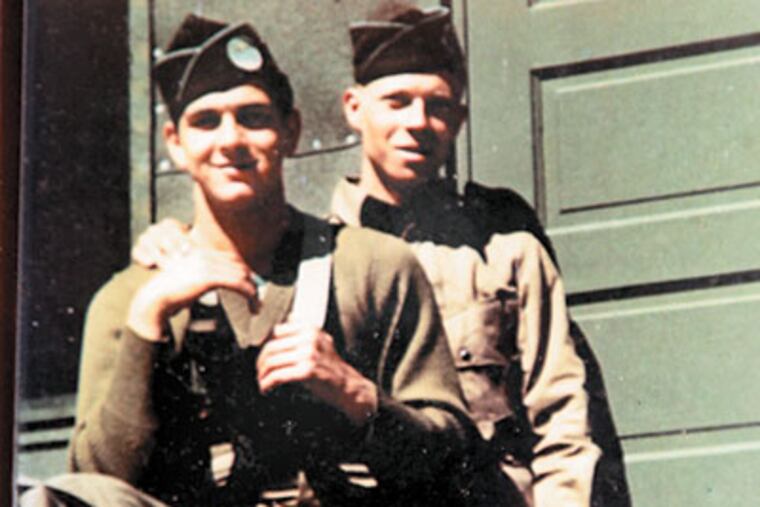Two S. Phila. vets fight to honor D-Day leadership
Sixty-six years ago Saturday night, Army Sgt. Bill Guarnere was dressed to kill. Ammunition and hand grenades bulged from his uniform and a Tommy gun was slung over his shoulder.

Sixty-six years ago Saturday night, Army Sgt. Bill Guarnere was dressed to kill.
Ammunition and hand grenades bulged from his uniform and a Tommy gun was slung over his shoulder as he sat in a C-47 transport on its way to Normandy, France.
By 1 a.m. - on June 6, D-Day - he parachuted directly into a firefight in the town square of Sainte-Mere-Eglise.
The same day, Edward "Babe" Heffron waited in England for his turn at combat and prayed for the success of the invasion, dubbed "Operation Overlord."
The two South Philadelphia natives later fought across Europe as members of the unit made famous by the best-selling book Band of Brothers and HBO mini-series of the same name.
Now both 87, the veterans are fighting together again, this time for a Normandy monument that honors their former commander, Richard Winters, and leadership of the Americans on D-Day.
"He was a good man and a good officer," Guarnere said of Winters, who has been in ill health in recent months and no longer gives interviews. "He knew what he was talking about and took care of his men. A monument is a wonderful idea."
Heffron said he "had the utmost respect for Winters. He carried himself like an officer and looked the part. He spoke to you like he knew what he expected out of you."
Winters, 92, of Hershey, was a first lieutenant with E or Easy Company, 506th Parachute Infantry Regiment of the 101st Airborne Division when he and his men dropped behind enemy lines on D-Day to successfully knock out German artillery trained on the Normandy beaches. The commander later rose to the rank of major and received the Distinguished Service Cross.
The proposed bronze statue - depicting Winters running with an M1 Garand rifle - is expected to be erected in 2011 at Sainte-Marie-du-Mont, near the Utah Beach and Sainte-Mere-Eglise. It would sit atop a stone base bearing names of the units that fought at Normandy and include a quote from Winters: "Wars do not make men great, but they do bring out the greatness in good men."
"This is not a monument just for Major Winters," said Tim Gray, a documentary filmmaker (timgraymedia.com) and Kingston, R.I., resident who has been leading the monument effort. "We used him [Winters] as an example of what leadership was on D-Day."
Gray began raising tax-deductible contributions for the project about a month ago, and has at least $25,000 toward the $400,000 needed to erect the monument and produce a film that will focus on the effort.
Curt Schilling - former pitcher for the Phillies and Boston Red Sox, and fan of Winters - is the national spokesman for the project and will narrate the accompanying documentary. "We're reaching out to anyone and everyone," Gray said. "We're hoping people, individuals and corporations, will recognize what we're doing."
Among Winters' biggest supporters are Guarnere and Heffron, who describe their own experiences while also praising Winters' steady leadership.
Sgt. Guarnere was ready for a fight by the time D-Day arrived. He had just learned of his brother Henry's death at the hands of the Germans in Italy and wanted revenge.
On the way to Normandy, Guarnere saw "constant flashes" of gunfire below. "If you ever saw a Fourth of July celebration, magnify that 10,000 times.
"I couldn't wait to get off the plane," he said. "I killed every German I could. That's why they called me 'Wild Bill.'
"I landed in the middle of a square and they [Germans] were shooting at us. They were kind of scared; we were scared, too."
Guarnere and Heffron later parachuted into Holland on Sept. 17, 1944, as part of Operation Market-Garden, one of the largest drops of airborne troops in history.
The Germans "were very much surprised," Heffron said. "You dropped and you held your ground. You did what you had to do."
Heffron and Guarnere were called upon again in December to fight at Bastogne during the Battle of the Bulge, as the German army tried - one last time - to throw back the Allies.
They were in a freezing, snow-covered forest when the German artillery zeroed in on the Americans there. Guarnere was helping a wounded comrade when a shell exploded, taking off his right leg. "I got whacked," Guarnere said. "The medics came and got me into a jeep."
Heffron continued on and was among the first soldiers to enter Adolph Hitler's Eagles Nest, the German leader's abandoned mountain sanctuary at Berchtesgaden. There, a German general and colonel asked to surrender to an American officer of equal rank.
"I said, 'Well, I'm pretty rank,' and got a lieutenant to take care of it," said Heffron, who refused to return the salute of the German officers.
He returned to Philadelphia in late 1945 and decided to check up on his old platoon sergeant. He walked to Guarnere's house, the two went out for a beer, and they have been inseparable ever since.
They still feel a strong bond and share a kind of celebrity as members of the "band of brothers."
Many people phone them or show up at their houses just to meet them and shake their hands. Last month, a woman from France came to Guarnere's door and gave him a bottle of wine.
They don't enjoy the attention; they'd prefer to put the war behind them. But these days, they'll endure it for the sake of their commander and the monument project.
Winters "deserves it," said Guarnere.